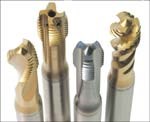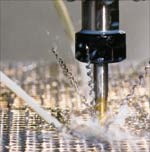Fast Taps For Today's CNC Machines
Emuge Corp. (Northborough, Massachusetts), has expanded its line of Full-Speed taps with ten new styles, each available in 20 different sizes, in both inch and millimeter.
Emuge Corp. (Northborough, Massachusetts), has expanded its line of Full-Speed taps with ten new styles, each available in 20 different sizes, in both inch and millimeter. "The taps allow exceptionally fast tapping at record speeds on modern CNC equipment," explains Emuge President Peter Matysiak. "Increased speed reduces cycle time while improving thread quality. If tapping time is reduced by 10 minutes per hour at a machine rate of $150, annual savings of $125,000 can be achieved and capacity can be increased by 833 machine hours."
The new taps are designed for freer, faster and more efficient cutting. The taps feature an advanced cutting geometry that reduces friction between the workpiece and the tool, according to the company. High-profile relief angles permit increased tapping speeds, reduced heat and longer tool life. An optimized number and shape of flutes, a shorter thread length, extremely hard surface coatings and coolant-through technology also contribute to the tool's improved performance.
Alan Shepherd, technical director for Emuge, explains that the Full-Speed taps were developed to tap at least two to five times faster than conventional taps. Achieving such performance improvements involves more than simply replacing a conventional tap with one of its newer tools. The tool is only one component (albeit an important one) of a system that includes a modern CNC machine tool with a rigid (synchronized) tapping cycle, a collet-type tap holder and, where applicable, use of a tap with coolant passages to deliver high-pressure coolant directly to the cutting zone.
"With all of the above elements in place, shops accustomed to tapping cast iron at speeds of 60, 70 or even 100 surface feet per minute with conventional taps will find that they can tap at speeds as high as 250 surface feet per minute with our new tools," Mr. Shepherd reports. "In tapping of stainless steels, users can go from 20 surface feet per minute to 80 to 90 surface feet per minute. They can cut cast aluminums at up to 250 surface feet per minute and tap mild steels even faster." The accompanying table compares the cutting speeds of the new taps to conventional taps for a range of materials.
In addition to faster tapping rates, the tools offer longer tool life—two to ten times the life of conventional taps in cast iron, according to Mr. Shepherd. Frequent tap breakage is no longer a common problem for metalworking firms. Mr. Shepherd attributes this to improvements in new machines, synchronized speed and feed controls, improved tap holders and improved taps. Another consideration: Holes are increasingly being drilled and tapped in the same setup on the same CNC machine, so that the tool breakage problems associated with tool positioning errors have virtually disappeared.
Related Content
-
Making Micro Threads
Production of micro threads can be challenging, but using the most suitable tools for a given application can simplify the task.
-
New Cutting Tool Technology Discovered at Paul Horn Open House
During a tour of the company’s campus in Tubingen, Germany, I and more than 3,000+ others were introduced to a number of new advances the company has made in cutting tool technology particularly as it relates to the medical industry.
-
The Value of Tool Monitoring on Rotary Transfer Machines
By using a tool monitoring system, shops can save costs associated with machine maintenance and downtime for tool changes while increasing cutting performance.















.png;maxWidth=300;quality=90)


